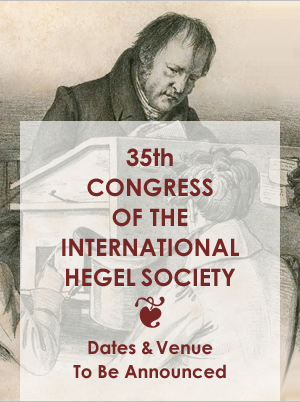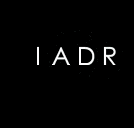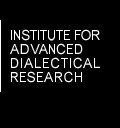PLEASE
NOTE: THIS EVENT HAS PASSED
35th Hegel Congress to be posted when announced
34th
International Hegel Congress
University of Zadar, Croatia
-
The
Spirit of Art and Culture
(5–8 September 2022)
LIST
OF SECTIONS:
1. Culture
as Objective Spirit
Though the concept of culture seldom explicitly occurs in Hegel’s
writings, we may
consider his philosophy of objective spirit as a theory of cultural
forms. Dilthey finds
Hegel’s concept of the objective spirit to be both “profound and
felicitous” because it
expresses the manifestations and objectivations of spirit that constitute
and
pluralistically structure the social forms of ethical life. This
world of spirit in which
“freedom is present as a manifest necessity” is none other than
our own life-world of
cultures both traditional and transformational.
2. The
Spirit of Political Culture
Hegel is known as a philosopher of civil society, which he understands
as the basis
of mediation between citizens and the state. In his conception,
the philosophy of right
thematizes life-forms that have shaped modern society (e.g. law
itself as the
existence of free will; personality; ethical life; the family; the
state as the
developmental apex of the system of ethical life). The phenomenon
of ethical life is of
central relevance for Hegel because it represents the sublation
of merely natural
freedom of choice in favor of the substantial spirit of freedom.
This session will
address these and related topics.
3. Artistic
Creativity & the Aesthetics of Production
Hegel characterizes art as the creative activity of the spirit through
which the
autonomy of the subject is expressed. Even though Hegel believes
that, in his time,
art has ceased to be “spirit’s supreme need”, art nevertheless remains
as a free play
of human imagination that continues fundamentally to shape the spirit
of modernity in
its basic constitution. The pantheon of ancient deities has been
consumed by the
“flame” of Hegelian subjectivity; the plenitude of the active spirit
is a new wellspring of
artistic creativity. In the modern age, spirit returns into its
own depths at the same
time that art discovers the sacredness of the human being. Topics:
The challenge of
art; creativity; ‘humanity’ ideal; subjectivity.
4. Modernity
and the Autonomy of Art
For Hegel, the modern age is characterized by the principle of subjectivity
in that
freedom has come to be recognized as “the property of spirit”. Modern
thought has
established its self-affirmation in the artistic sphere, as well,
to the extent that
modernity proclaims the autonomy of art and its independence from
religious
influence. In this way, individual subjects and their sensibility
become the foundation
and bearers of aesthetic experience and creativity. Topics: modernity,
individuality,
autonomy of art, are in relation to religion and society.
5. Art
After the End of Art
Art with its many influences, Hegel suggests in his lectures on
aesthetics, is the first
true teacher of humanity and among the most comprehensive truths
of spirit that
have emerged in the course of history. Hegel’s controversial thesis
of the end of art is
one of the most important topics in the history of the reception
of his philosophy. His
judgment that art is born from the spirit and is therefore understood,
interpreted, and
evaluated by the spirit, serves as a point of departure for reflection
on art and its role
in society.
6. Hegel
and the Tradition
We should reckon not only the political state with its ethical and
legal among the
achievements of objective spirit, but also culture in a broader
sense. This section
focuses on the various aspects of the transformation of the tradition,
which is of
course also subject to critical assessment. The schism of Hegel’s
school into Left and
Right Hegelians is itself a result of divergent interpretations
of tradition. Hegel is a
thinker who critically interprets and evaluates the tradition from
the standpoint of
spiritual freedom.
7. Hegels
Conception of Bildung
Bildung (variously translated as culture, education, and formation)
is one of the key
concepts of Hegelian philosophy. The formative development of humanity
in its
entirety no less than that of the individual self fall within its
scope. As a process
through which human potential develops, Bildung also implies progress
in the
consciousness of freedom and the cultivation of institutional life-forms.
This section’s
topics may include e.g. education, the role of universities, the
concept of the person,
second nature.
8. Religion
in Culture
Hegel defended the view that every world-historical epoch is shaped
by a specific
form of religion, such that religion proves to be the site where
cultures express their
conception of truth. Hegel suggests (Enzyklopädie, § 482)
that the most significant
revelation of truth, namely that the human being is born into actual
freedom, takes
place in the Christian religion. This section focuses on the question
of the extent to
which the various historical religions have developed as cultural
forms and how they
relate to each other in multi-religious societies and to the growing
proportion of non-religious individuals.
9. The
Cultural Significance of the History of Philosophy
Hegel’s conception of spirit as that “by virtue of which humans
are human” is
important for assessing the relevance of the history of philosophy.
For Hegel
conceives spirit historically just as, conversely, he understands
history as spiritual in
essence. To the extent that the history of philosophy is the history
of humans’ grasp
on truth, it is clearly of special relevance and an important topic
of research. We
study the heroes of the history of philosophy not merely in order
to reconstruct their thought, but to comprehend and evaluate them
from the standpoint of their relevance
for truth. The history of philosophy is itself an integral part
not only of systematic
philosophy, but of our cultural self-reflection in a broader sense.
10. Culturam
conservare et Spiritus elevare
As an object of interpretation, the history of spirit (Geistesgeschichte)
remains both
an inexhaustible source and a challenge for the human sciences
(Geisteswissenschaften). Gadamer saw it as a task for hermeneutic
reflection to
retrace the pathway of Hegel’s Phenomenology of Spirit in order
to grasp the
substantiality of which subjectivity is part. Some potential topics
for this section:
hermeneutics, the task of the human sciences, history of reception/effective
history
(Wirkungsgeschichte), philosophy of mind/philosophy of spirit, the
distinction between
the natural sciences and the human sciences.
INTERNATIONAL
HEGEL SOCIETY:
hegel-gesellschaft.org















